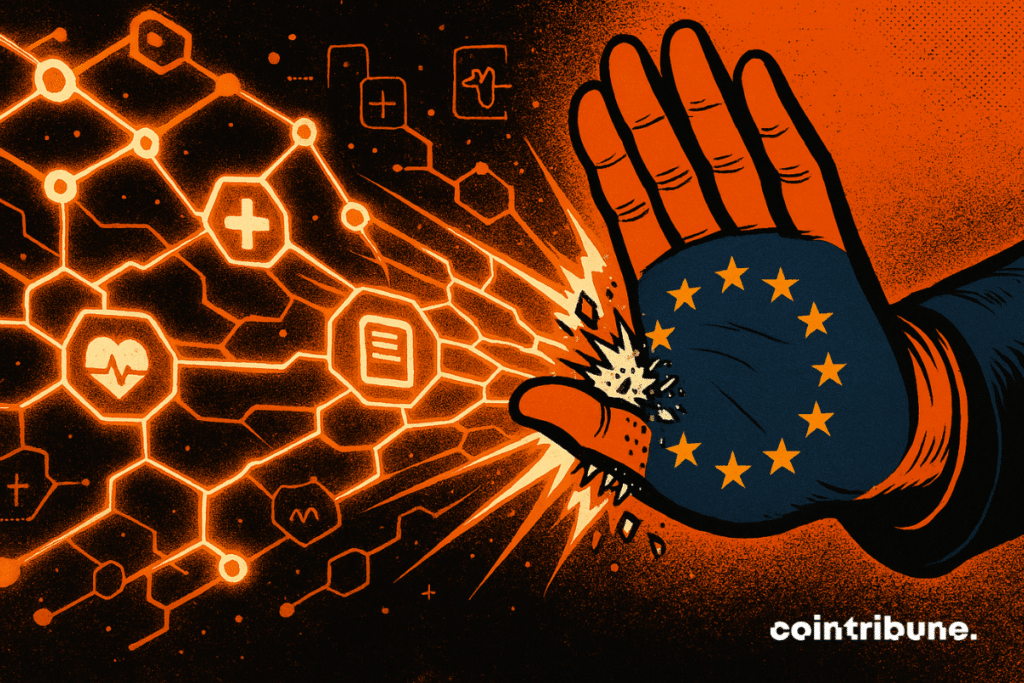2:05 p.m. ▪
4
Min read ▪ by
Europe vacillates. When Asia is experimenting and the United States invests strongly, the former continent hesitates. Blockchain, despite its immense potential for the health care sector, is progressing in Europe as a snail on a highway. This slowness raises an uncomfortable question: is the technological disturbance really perceived as a priority of European leaders?


Brief
- Other countries innovate, the EU multiplies regulations.
- Europe remains a fragmented technological patchwork.
- Blockchain in the health care sector suffers from conflictuals with cryptocurrencies.
A paralyzing regulation despite good intentions
European regulations, designed to clarify, ends up discouraging. The Mica regulation aimed at harmonize the marketBut that scares small players. The burden of administrative requirements kills many initiatives to their stammerings. “”Startups, in particular, do not want to fight in the legal jungle», Note Volker Nürnberg, professor at the Munich Technical University.
In Germany, the situation is caricatured. Awarded projects such as electronic prescriptions have never been deployed. And the GDPRAlthough based on commendable principles, becomes Yet another barrier. The blockchain works on transparency, while the regulations require erasure. For Lukas Weidener, this contradiction is heavy:
These regulations can lead Germany to lose its place in the global development of technology.
We hope that this rigor will become a competitive advantage. But to date, it acts mainly as a brake.
A fractured European, a fragmented market
Within Europe’s borders, strategies differ. Estonia digitizes its condition with the blockchainGermany experiences digital identity, Switzerland attracts cryptographic unicorns. But this technological patchwork harms consistency.
Result: systems unable to communicate with each other. “”Fragmentation complicates pan -European projects»Deplores Nürnberg again.
Health careOn the side, remains A highly regulated fieldnot subject to audacity. However, blockchain could transform daily life: secure data sharing, integrity of clinical trials, traceability of drugs.
Without a common framework, these promises remain empty words. Worse: Each country imposes its own standards, making cross -border projects almost impossible. A technology intended to connect data is, in Europe, hampered by administrative borders.
Blockchain: a tarnished image, a badly understood potential
The blockchain suffers from A notorious reputation. Too often confused with cryptographic speculation, it inspires more distrust than enthusiasm. “”Some officials always see blockchain as a digital casinoRemember an expert ironically.
However, In the health care sector, use cases are solid. Immutable patient files, secure remote controls, automated reimbursements via smart contracts … The soil is fertile. But gardeners are missing. Fear of the unknown, reinforced by cryptography scandalsblocks institutional curiosity. Even the potential environmental advantages of certain blockchains fail to convince.
Weidener clearly says it:
The perceived energy consumption of blockchains dissuades decision -makers, especially when sustainability is a priority.
Confusion is unfair but real. And as long as innovation is considered a risk rather than an opportunity, it will not find a fertile land.
It is not a coincidence that South Korea and the United States are advancing. There they finance, test and adjust. In Europe, they regulate. Many observers agree: the EU presents the image of a bureaucratic continent, quickly to regulate but slow to innovate. Talents leave, projects migrate, standards are set elsewhere. And Europe comments this. If he wants to have weight tomorrow, he will have to dare today. Without that, the blockchain in health care will only be just a missed meeting.
Maximize your Consribune experience with our “Read to garn” program! For each article you read, earn points and access exclusive rewards. Register now and start gaining advantages.
The Blockchain and Crypto revolution is underway! And the day when the impacts will be felt on the most vulnerable economy of this world, countertopury, I would say that I was there for Yerque chose
Non-liability clause
The points of view, the thoughts and opinions expressed in this article belong only to the author and must not be considered as investment advice. Do your own research before making investment decisions.




